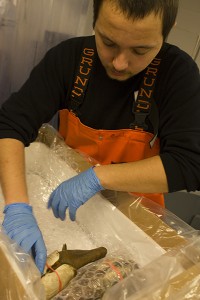Mar 19th, 2014 Northwest Indian Fisheries Commission
Western Washington tribes are quickly recovering from a sudden ban in December 2013 on selling geoduck to China.
The Asian country claimed it received a shipment of geoduck from Ketchikan, Alaska, that had high levels of paralytic shellfish poisoning, and a shipment from Poverty Bay in Puyallup, Wash., that had high levels of arsenic.

As a result, China announced it was banning all imports of bivalve shellfish from Washington, Oregon, Alaska and Northern California. This was just before the Chinese New Year, a lucrative time for harvesters and buyers, when geoducks are traditionally served.
“It was bad at the beginning because we didn’t know what was going on,” said Tony Forsman, general manager of the Suquamish Tribe’s Suquamish Seafoods, which regularly ships shellfish internationally. “China didn’t tell us for two weeks they were doing this.”
Officials from the National Oceanic and Atmospheric Administration (NOAA) have been working with Chinese officials to determine how they came to their conclusions and have been in close communication with Washington Department of Health and western Washington tribal officials about the progress. Officials from NOAA are meeting in person with officials from China’s General Administration of Quality Supervision, Inspection and Quarantine this month to further discuss the situation.
The shellfish in question from Poverty Bay passed all the rigorous tests needed to be exported to China, said David Fyfe, shellfish biologist for Northwest Indian Fisheries Commission.
“We’re working with China to figure out why we suddenly don’t meet their standards,” he said.
In the meantime, harvesters and buyers are continuing to send their catches to other Asian countries, including Vietnam. U.S. officials are asking China to reduce the ban area from the West Coast to just the two original areas of concern.
Suquamish Seafoods had to layoff nine employees in December – including those who sort, pack and ship the shellfish – but everyone was re-hired by mid-February. Suquamish Tribe harvesters annually gather nearly 500,000 pounds of geoduck.
“There have been blips in the market, such as having to sell smaller geoduck, plus market pressure forced prices down,” Forsman said. “We’ve all just had to adjust – divers, market, buyers, us. Things are fine now but we had to adjust and adjust fast.”
Despite the “blip”, it did prove that the United States shellfish quality control system works, Fyfe said. Harvesters have to meet the National Shellfish Sanitation Program standards, which includes providing information about the harvester, day and tract from which shellfish was harvested.
